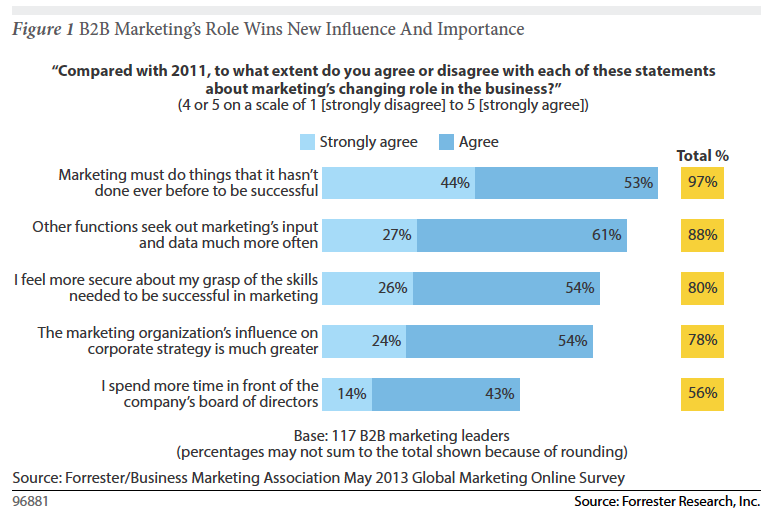Do you think the senior executive team is excited about the big lead generation campaign you just launched? Nope. How about the number of “Likes” on your corporate Facebook page? Think again. Marketing doesn’t matter in many organizations, because it thinks, operates, and worst of all, reports “small.”
Executives sitting in the “C-suite” got there by thinking big, managing big, and reporting “big”. Marketers commit hari-kari with this group by reporting tactical level activities – “minutia,” that garners no ones attention. Do you think the head of sales is reporting the number of sales calls reps make a day? No. If you want to get their attention, you have to make marketing more important to them. Here are five ways to go “Big.”
- Big Bets – if you want marketing to be valued you have to understand, and link, to what the organization values. It’s that simple. If it’s market share, connect marketing objectives and activities to acquisition or/and account penetration. If it’s profit, understand the drivers and align your teams’ efforts appropriately.
- Big Strategy – once you understand how to link marketing to the business objectives your job is then to connect those big bets to day-to-day marketing activities. Your smarts will be needed to take the marketing requirements from the product and sales organizations (which may be very tactical) and link them to the overall marketing strategy that aligns to the “big bets.” Warning – this will require math, perhaps lots of it.
- Big Plays – to execute, organize your marketing objectives as defined by your internal stakeholders into 2 or 3 “big plays.” If market share is a key growth objective, a big play should focus on an area that has the greatest opportunity to do that…a specific market, product and customer. All marketing activities/campaigns should be nested around that “play.’ Messaging is critical here because it is the “big play” wrapper that creates consistency in the communication across execution –think “Smarter Planet.” IBM discovered years ago that the best performing campaigns stayed in market the longest, and had the highest level of integrated tactics. It takes focus and discipline to do, but if you can get there it will make your life easier by allowing you to organize everything under a big play umbrella, and if things don’t fit…then maybe you don’t do it.
- Big Results – the first rule here is to understand that measurement and reporting are different. Measure everything, but only report “process” or “results” metrics. Executives care about “outputs,” not “inputs.” Inputs are activities, outputs are results, know the difference.
- Big Balls – ya gotta have ‘em. You are going to have to get comfortable with, and embrace risk. If you do this right, you will be placing bets, that at the time, you will not know how, or if, they are going to pay off. Years ago, I worked with a CEO that committed to double the size of the business in three years. The CMO calculating sales cycles realized to support that growth marketing needed to double the number of leads that year. She had no idea how she was going to do it, but it caught the attention of the senior management team, focused her team, and it happened. But as she learned, you don’t try to go it alone. Reach out to others with your plan, get their buy-in and support. Level set expectations on timing and performance, it may require a significant investment in time and money for the “big bets” to pay off. Set big goals, but be realistic in getting there.
The time for going “big” is now. In Forrester’s recent B2B CMO’s Must Evolve or Move On report, 97% of marketing leaders who were survey agree with the statement that “Marketing must do things that is has never do ne before to be successful.”
ne before to be successful.”
The other interesting, and important nugget from the research is that marketing is playing a bigger role in influencing corporate strategy, and other functions. Make sure you’re capturing this opportunity at your organization by thinking, and by being — “Big”.
